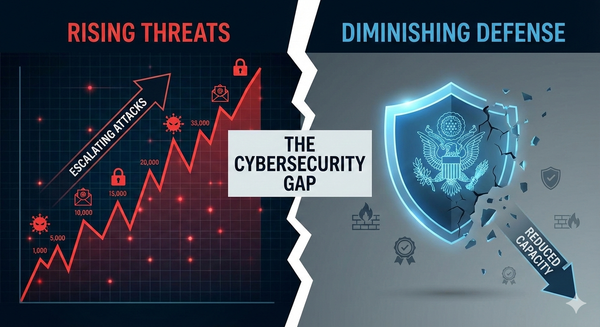Sunday Tech Digest: China Cyber Claims & F5 Security Breach - Oct 19, 2025

Today's tech landscape is more about thoughtful refinements as we enjoy our Sunday. While quieter than the headline-grabbing stories from earlier this week, I've been tracking some developments that reveal how technology continues evolving with a stronger focus on human needs and security. Here's what caught my attention this Sunday
China Claims Evidence of US Cyber Attack
The most significant story today comes from geopolitical tensions in cyberspace. China has announced it found evidence of a US cyber attack on a state agency. While details remain sparse and claims from either side in cyber attribution are always uncertain, this development underscores the escalating nature of state-sponsored cyber operations.
What concerns me most isn't just this specific incident, but the broader pattern it represents. Cyber warfare has moved from a theoretical threat to an active battleground, with accusations and counter-accusations becoming routine. The challenge is that cyber attribution is notoriously tricky—determining with certainty who conducted an attack requires technical evidence that's rarely made public.
This also highlights an uncomfortable reality: the same tools and techniques used for legitimate intelligence gathering can easily be characterized as attacks, depending on your perspective. The line between defensive cybersecurity operations, intelligence collection, and offensive cyber operations has become increasingly blurred.
For businesses and organizations, the lesson is clear: nation-state cyber capabilities are real, active, and expanding. The days of thinking cyber threats come only from profit-motivated criminals are long over. Infrastructure protection must account for adversaries with unlimited resources and sophisticated capabilities.
Security Firm F5 Reveals Multi-Year Breach
In sobering news that reinforces my concerns about cyber threats, security firm F5 disclosed that hackers had been lurking in its systems since 2023. Let that sink in—a company whose business is security had undetected intrusions for potentially two years.
This isn't just embarrassing for F5; it's a stark reminder that even organizations with deep security expertise can be compromised. The sophistication of modern attack groups, particularly those with state backing, means that "dwell time"—how long attackers remain undetected in systems—continues to increase.
What makes this particularly troubling is the access F5 systems could provide. As a major provider of application delivery and security solutions, F5's infrastructure touches countless enterprise networks. A breach here doesn't just affect one company; it potentially provides footholds into many others.
The disclosure deserves some transparency credit, even though it comes years late. Too many organizations discover breaches and try to minimize or hide them. The 58% of security professionals who reported being told to keep breaches confidential (that stat from earlier this week keeps haunting me) suggests F5's disclosure is the exception, not the rule.
SpaceX Continues Orbital Achievements
On a more optimistic note, SpaceX continues its impressive cadence of launches and orbital operations. While specific details from today are limited, the company's steady progress in making space access routine is remarkable.
What's fascinating about SpaceX is how they've normalized what would have been headline news a decade ago. Regular orbital launches, booster recoveries, and satellite deployments have become almost mundane—which is precisely the point. Making space access reliable and routine is how you build a sustainable space economy.
SpaceX represents an essential model for the tech industry: iterative development, rapid testing, and willingness to fail fast and learn. While their approach doesn't work for every sector (you can't exactly "move fast and break things" with human spaceflight), the underlying philosophy of continuous improvement and ambitious goals has influenced thinking far beyond aerospace.
The Bigger Picture: Technology Finding Balance
Looking at today's stories together, I see a theme emerging: technology is searching for responsibility.
The cyber attack claims and F5 breach remind us that capability without security is vulnerability. SpaceX shows us that pushing boundaries and maintaining reliability aren't mutually exclusive.
This is a necessary maturation for the tech industry. The "move fast and break things" era gave us incredible innovation but also massive security breaches, privacy violations, and societal disruption. We're entering a phase where the industry needs to demonstrate its ability to innovate responsibly.
What This Means for Organizations
Security Remains Critical: The F5 breach and China cyber claims underscore that security can never be an afterthought. Organizations must assume breach, implement zero-trust architectures, and invest in detection capabilities, not just prevention.
Transparency Builds Trust: Despite the delay, F5's disclosure is the right approach. Organizations that hide breaches lose far more trust when the truth inevitably emerges.
Geopolitical Risks Are Real: The China cyber claim reminds us that business operations happen in a geopolitical context. Supply chain security, data sovereignty, and infrastructure resilience must account for nation-state threats.
My Sunday Takeaways
- Security is everyone's problem: No one is immune to cyber threats, from security companies to nation-states.
- Transparency matters: Hiding problems creates bigger problems. Organizations should develop cultures that support appropriate disclosure.
- Routine achievement is success: SpaceX's ability to make space access boring is its greatest triumph.
- Balance is the new frontier: The next phase of tech evolution is sustainable innovation, not just rapid growth.
As we wrap up the weekend, these quieter stories remind me that technology's impact isn't always measured in flashy launches or dramatic announcements. Sometimes the most important developments are the ones that make technology more trustworthy, more secure, and more focused on actually serving human needs.
The question isn't just what technology can do—it's what it should do, and whether we're building systems we can trust with our data, our security, and ultimately our lives.
References
Cybersecurity & Geopolitics:
- Bloomberg Technology - "China Says It Found Evidence of US Cyber Attack on State Agency" (October 19, 2025)
- Bloomberg Technology - "Hackers Had Been Lurking in Cyber Firm F5 Systems Since 2023" (October 18, 2025)
General Tech Trends:
- TechRadar News Archive - October 2025 Technology Updates



